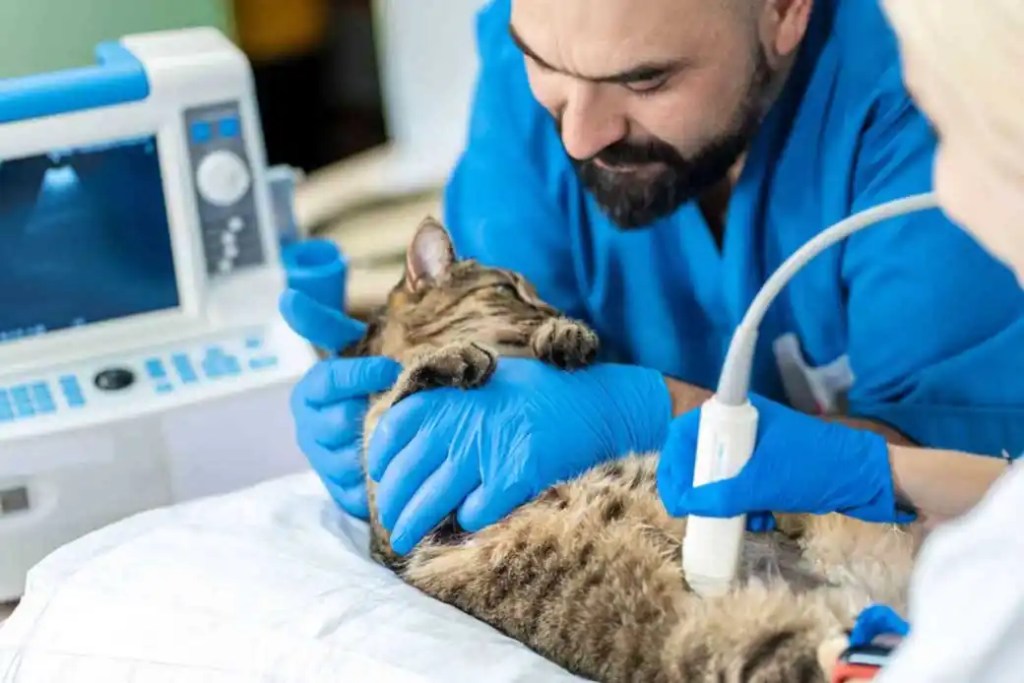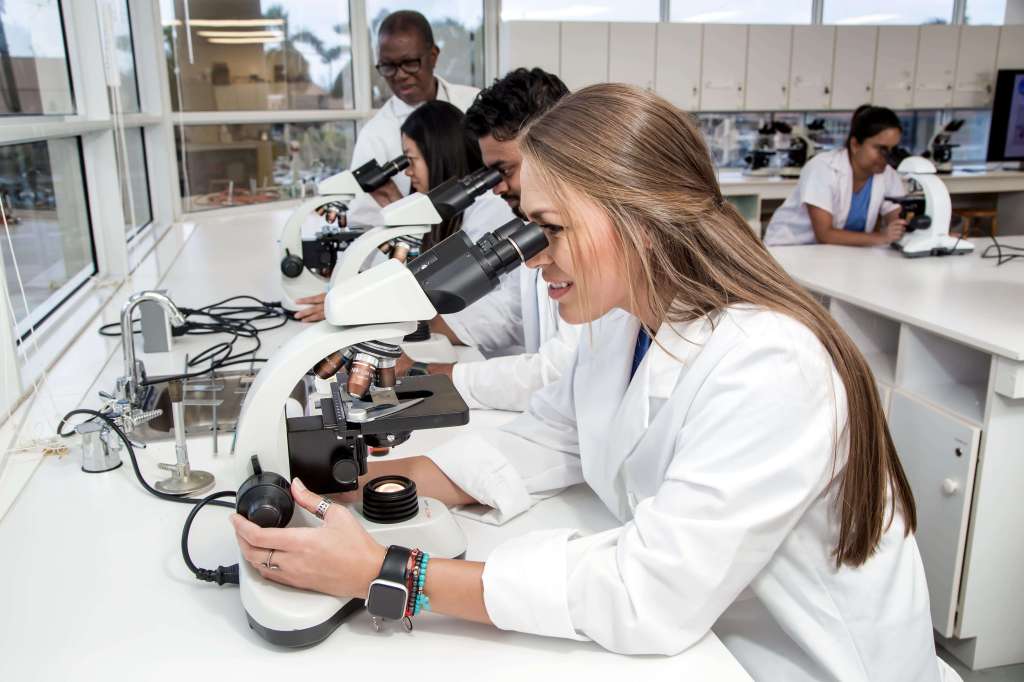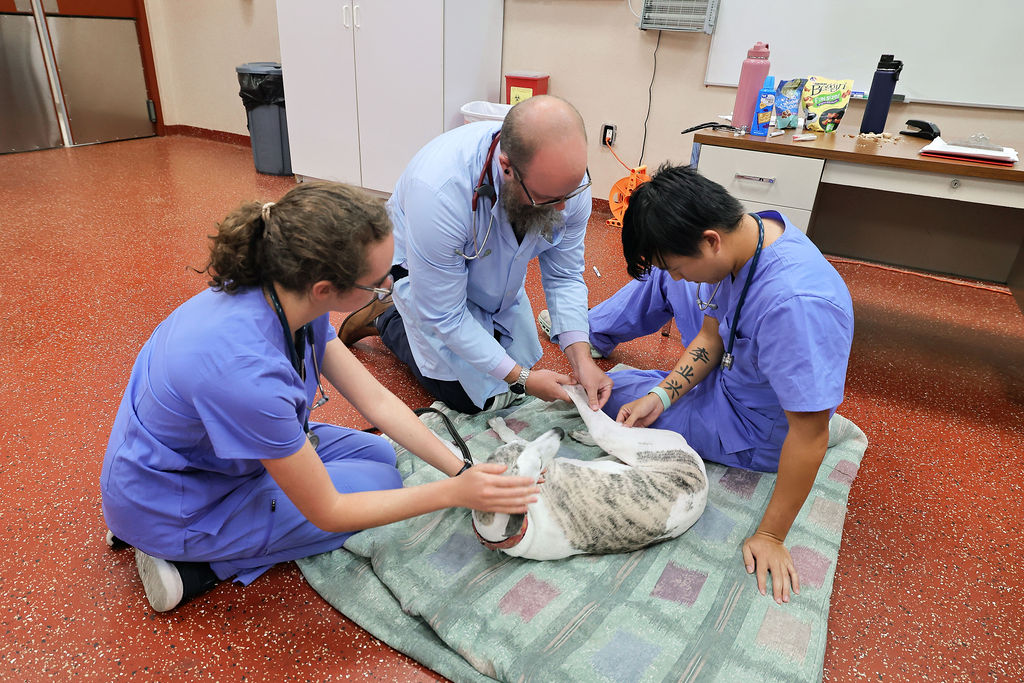
What Is the Future of Veterinary Medicine?
Discover key advances and innovations that will impact veterinarians and their animal patients.
Veterinary medicine is at the brink of an exciting transformation. A recent survey revealed that nearly 40% of veterinarians are already using AI tools – just one example of the fact that the life of a vet is constantly changing.
Emerging technologies offer tremendous advancement opportunities for veterinarians. With technological breakthroughs, research advances and an ever-expanding understanding of animal health, this evolving field promises exciting veterinary career opportunities for those ready to embrace change.
In this blog post, we dive into the trends shaping the future of veterinary medicine and uncover what lies ahead for aspiring veterinarians.
How Technology Will Change Veterinary Medicine
You may think you already have a pretty good idea of what a veterinarian is, but technology is revolutionizing veterinary medicine. From telemedicine to artificial intelligence (AI), new tools are enhancing how veterinarians diagnose, treat and care for animals. Imagine consulting with a pet owner via video call or using AI to pinpoint a diagnosis faster than ever before – these are becoming everyday realities in veterinary practice.
Telemedicine is breaking down barriers, especially in remote areas where veterinary clinics may be scarce. Wearable devices like fitness trackers for pets are providing real-time health data, empowering veterinarians to catch issues early. Meanwhile, AI in veterinary medicine is streamlining diagnostics and even assisting in complex surgeries.
These advancements aren’t just tools – they’re opportunities for you to excel in a field that values innovation and dedication. As a future veterinarian, you’ll harness these technologies to provide top-tier care, blending cutting-edge science with human compassion.
“Veterinary Medicine is dynamic and ever-changing, adapting to fit an evolving world with not only a client and patient mindset but for ease of communication between doctors and other professionals,” shared Yash Patel, SMU DVM student. “While new technology is very helpful, in the hands of a well-trained veterinarian it can be life changing.”



Future Trends in Veterinary Medicine
As the landscape of veterinary medicine continues to evolve, several key trends are emerging. These trends are setting the stage for a new era of care that promises to redefine the profession and open up significant veterinary career opportunities. In this section, we examine three critical areas that are shaping the future.
Telemedicine and Virtual Consultations
Telemedicine is breaking down geographical barriers and providing access to veterinary care for clients in remote or underserved areas. By using video consultations and digital monitoring tools, veterinarians can extend their services far beyond their local practice. This model of care not only ensures timely medical attention but also creates advancement opportunities for veterinarians by allowing them to reach a wider client base and collaborate with peers across the globe.
Telemedicine is not merely a temporary trend; it is set to become a permanent fixture in veterinary practice. With the expansion of broadband internet and mobile technologies, virtual consultations are becoming more accessible and reliable. This trend is especially significant for large animal practitioners, where on-site visits can be logistically challenging. The rise of telemedicine is a testament to the field’s adaptability and commitment to providing high-quality care regardless of location.
Personalized Medicine: Tailored Treatments for Animals
Personalized medicine represents a shift from the traditional one-size-fits-all approach to treatment. Advances in genetic testing and biomarker research are making it possible to design treatment protocols that are tailored to an individual animal’s specific needs. This strategy not only enhances treatment outcomes but also minimizes adverse effects by targeting therapies more precisely.
In the future of veterinary medicine, personalized medicine is expected to revolutionize how diseases are managed. By analyzing genetic predispositions and individual responses to medications, veterinarians can formulate more effective prevention and treatment plans. This approach is particularly important in managing chronic diseases and conditions that require long-term support, ensuring that each animal receives care that is as unique as they are.
Personalized medicine also underscores the importance of ongoing research and data collection. Veterinary practices are increasingly investing in diagnostic tools that can provide detailed insights into an animal’s health profile. As more data is gathered, treatment protocols will continue to improve, further driving advancement opportunities for veterinarians in this rapidly evolving field.
The Impact of Artificial Intelligence in Veterinary Diagnostics
Artificial intelligence (AI) is transforming the diagnostic process by enabling faster and more accurate analysis of complex medical data. The integration of AI in veterinary medicine allows practitioners to identify patterns that may not be immediately apparent through traditional methods. For instance, AI algorithms can analyze imaging data to detect early signs of diseases such as cancer, ultimately leading to quicker and more effective interventions.
The application of AI in diagnostics is not only enhancing accuracy but also optimizing workflow efficiency. By automating routine tasks, AI frees up valuable time for veterinarians to focus on more critical aspects of patient care. As diagnostic technologies continue to evolve, AI will play an increasingly pivotal role in bridging the gap between research and clinical practice.
Incorporating AI into veterinary diagnostics also has significant implications for veterinary education and training. Future veterinarians will be trained to work with advanced technologies, ensuring that they are well-equipped to navigate the evolving landscape. This evolution highlights the need for continuous learning and adaptation, reinforcing the idea that future trends in veterinary medicine are here to stay.
Emerging Trends in Veterinary Medicine
Beyond technology, broader trends are influencing the future of veterinary medicine. These trends, while still in their early stages, hold the potential to further evolve the scope of veterinary services.
Environmental Changes and Their Effect on Animal Health
The effects of the climate crisis and environmental degradation are increasingly evident in the patterns of animal health and disease. Shifts in climate can influence the distribution of parasites and vectors, leading to the emergence of new infectious diseases in animal populations. As a result, veterinarians are expected to play a critical role in monitoring and managing these changes. The future of veterinary medicine is one that is deeply intertwined with environmental stewardship.
The growing focus on environmental health is prompting veterinary schools to integrate sustainability and ecological health into their curriculums. This educational shift ensures that the next generation of veterinarians is not only clinically adept but also knowledgeable about environmental influences on animal health. This holistic approach reinforces the idea that veterinary medicine is evolving to meet the challenges of a rapidly changing global landscape.
Advancements in Animal Health Monitoring
Advancements in sensor technology and wearable devices are revolutionizing the way veterinarians monitor the health of animals. Continuous monitoring devices can track vital signs and behavioral changes in real time, allowing for early detection of health issues before they become critical. These technological tools are rapidly becoming an essential part of modern veterinary care and offer significant advancement opportunities for veterinarians.
Wearable devices are not just for pets; livestock and wildlife are also benefiting from these advancements. The ability to collect and analyze data continuously means that trends in animal health can be identified quickly, leading to more timely and effective interventions. With this holistic view, veterinarians can devise more personalized treatment plans and preventive strategies.
Study Veterinary Medicine at St. Matthew’s University
The future of veterinary medicine is a landscape rich with innovation and opportunity. From telemedicine and personalized treatments to the transformative power of AI and emerging environmental challenges, every facet of the field is being reimagined.
At St. Matthew’s University School of Veterinary Medicine (SMUSVM), we’re here to support you with a comprehensive education that prepares you for these innovations and beyond. Our rigorous Doctor of Veterinary Medicine (DVM) program provides the medical education and hands-on learning that animal lovers need to succeed as future vets. Beneficially, our commitment to individualized support and extensive student services work together to ensure that students are ready for both the academic and personal requirements of veterinary school.
Pursuing a Doctor of Veterinary Medicine (DVM) degree is a journey of dedication and reward. Once completed, you’ll be a practicing veterinarian and ready to make an impact in the field! To get inspired, check out what it’s like to walk across the graduation stage as a Doctor of Veterinary Medicine:
If this aligns with your animal healthcare career goals, learn more about applying to SMUSVM today!
FAQs About the Future of Veterinary Medicine
Veterinarians will continue to be essential as the required care for animals grows in complexity and importance. Advances in medical technology and increased awareness of animal welfare ensure ongoing demand for skilled professionals. The evolving landscape of animal health confirms that veterinary expertise will remain a vital part of the future.
Yes, veterinary medicine is experiencing significant growth driven by technological advances and increasing global demand for quality animal care. Innovations such as telemedicine and personalized treatments are expanding the field’s scope. This growth creates numerous advancement opportunities for veterinarians and reinforces the profession’s promising outlook.
The outlook for the veterinary industry is highly positive, with emerging technologies and new treatment modalities driving progress. Increased investments in research and development are enhancing diagnostic accuracy and treatment outcomes. Overall, the field is set to thrive as it adapts to modern challenges and embraces innovations in veterinary medicine.
AI will revolutionize veterinary medicine by improving diagnostic processes and streamlining treatment plans. Its integration promises faster, more accurate analysis of complex data, which enhances patient care. The rise of AI in veterinary medicine is transforming how veterinarians approach diagnosis and therapy, ensuring a more proactive and efficient care model.
Request Information